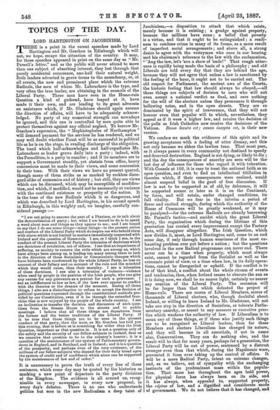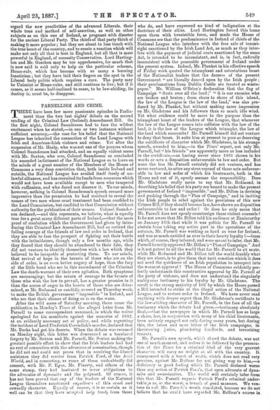TOPICS OF THE DAY.
LORD HARTINGTON ON JADOBINL9M.
TREE is a point in the recent speeches made by Lord HRartington and Mr. Goschen in Edinburgh which will not, we hope, escape the attention of the country. It may, for those speeches appeared in print on the same day as "Mr. Parnell'e letter," and as the public will never attend to more than one subject of absorbing interest, they lost through that purely accidental occurrence, one-half their natural weight. Both leaders adverted in grave terms to the ascendency, or, at all events, the new and prominent place which the extreme Radicals, the men of whom Mr. Labouchere is the type, and very often the true leader, are obtaining in the councils of the Liberal Party. These men have seen in the Home-rule Question a kind of godsend, have leaped at it, have made it their own, and are lending to its great advocate an assistance which, if Mr. Gladstone should again assume the direction of affairs, will have to be adequately acknow- ledged. No party of any numerical strength can nowadays be ignored, and this one is controlled by men quite able to protect themselves against any official neglect. To borrow Mr. Goschen's expression, the "Mephistopheles of Northampton" will demand payment for the services he has rendered, and we may well doubt whether Faust will be as successful in political life as he is on the stage, in evading discharge of the obligation. The band which half-acknowledges and half-repudiates Mr. Labouchere as leader grows daily into a party ; indeed, with the Parnellites, is a party in number ; and if its members are to support a Government steadily, yet abstain from office, heavy concessions must be made to their views, and some concession to their tone. With their views we have no present quarrel, though many of them strike us as marked by reckless disre- gard alike of economics and of history ; but still, they are views which can be discussed, which may be susceptible of modifica- tion, and which, if modified, would not be necessarily at variance with the continued existence or prosperity of the nation. It is the tone of the new Radicals which is so dangerous, and which was described by Lord Hartington, in his second speech in Edinburgh, in this weighty and, we imagine, carefully con- sidered passage :— "I am net going to assume the part of a Pharisee, or to talk about the demoralisation of party ; bat what I am bound to do is to speak a word about men and things as they appear to me ; and I am bound to Bay that I do see some thinga—many things—in the present action and conduct of the Liberal Party which do inspire me who behold them with alarm which is not limited to matters immediately connected with Ireland and the question of Home-rule. I see, or I think I see, in the conduct of the present Liberal Party the toleration of doctrines which are doctrines of revolution, not of reform. I see that an impatience of suffering, an anxiety to remove the evils which are among on, which have always been among us, is leading too many among them to look in the direction of those Socialistic or Communistic changes which have hitherto been condemned by the whole Liberal Party, no less on account of their fallacy and on amount of the ruin and the mischief which they would cause, than their morality. I see a toleration of those doctrines. I see also a toleration of violence—violence when nsed by people in the position of the Irish people, who can give any excuse for any grievance as a pretext for each a grievance. I see an indifference to law as law, if the laws ever appear to conflict with the theories or the dreams of the moment. Seeing all these things, I also see a disinclination to refuse to accept the decision of political questions expressed through the constitational methods pro- vided by our Constitution, even if it be through the extended fran- chise that is now enjoyed by the people of the whole country. I see an inclination to transfer the decision and discussion of such ques- tions from the Senate House to the streets and to public meetings. I believe that all these things are departures from the former and the better traditions of the Liberal Party. If it be true that these things are to be seen in the present conduct of that party, then the issue, as Mr. (leacher' has told you this evening, that is before us is something far wider than the Irish Question, important as that question is. It is not a question only of the safety and the security of our fellow-subjects in Ireland, dear as we conceive that question to be to the country's honour ; it is a question of the maintenance of our system of Parliamentary govern- ment in England, and in Scotland, and in Ireland ; and it is a question of the prosperity, and perhaps even of the very existence, of the millions of our fellow-snbjects who depend for their daily bread upon the system of credit and of confidence which alone can he supported by the maintenance of law and of order."
It is unnecessary to prove the truth of every line of those sentences, which some day may be quoted by the historian as marking a new point of departure in the party divisions of the Kingdom. The evidence is all around us, recog- nisable in every newspaper, in every new proposal, in every day's debates. There is no one who understands politics but sees in the new Radicalism a deep taint of Jacobinism,—a disposition to attack that which exists, merely because it is existing ; a grudge against property, because the millions have none ; a belief that poverty is a virtue, and that it ought to be extinguished; a readi- ness to condone crime in many of its forms, as a mere result of imperfect social arrangements ; and above all, a strong desire to agree with the vestryman who once in our hearing met his chairman's reference to the law with the exclamation; "Aug the law, let's 'aye a show of 'ands I" That rough utter- ance is rapidly being made the basis of a philosophy ; and old Liberals are told every day that they are behind the age, because they will not agree that unless a law is sanctioned by the feeling of the hour, it ought not to be carried out. The. old respect for Parliament, the ancient awe of the Courtly, the historic feeling that law should always be obeyed,—alt these things are subjects of derision to men who will not even accept a national verdict as final, and care nothing for the will of the electors unless they pronounce it through bellowing noise, and in the open streets. They are se dominated by the spirit of irreverence, that they will not honour even that popular will to which, nevertheless, they appeal as if it were a higher law, and receive the decision of the polls as Irish Catholics now receive the decisions of the Vatican. Roma locate est ; cause ineepta eat, is their new version.
We confess we mark the evidences of this spirit and its growing acceptance with a feeling of utter dismay, and this not only because we abhor the lawless tone. That must pass, as it always passes in every community not destined to speedy and deserved destruction. England is not dying, or likely to die ; and the day the consequences of anarchy are seen will be the last day of influence for those who regard it with toleration. With Consols at 102, it is easy to treat the national faith as ao open question, and even to find an intellectual titillation in theories which, if their consequences were realised, would, almost suspend belief in the good of free discussion. If law is not to be supported as of old, by deference, it will be supported sooner or later as it is on the Continent, by force, and will retain, under changed conditions, its full vitality. But we fear in the interim a period of fierce and excited struggle, during which the authority of the House of Commons will be greatly weakened, or it may be paralysed—for the extreme Radicals are already borrowing- Mr. Parnell's tactics—and amidst which the great Liberal Party, the organisation which during the lifetime of this generation has carried every improvement except the Factory Acts, will disappear altogether. The Irish Question, which now divides it, must, as Lord Hartington said, come to an end some day, if only through human weariness of the most ex- hausting problem ever put before a nation ; but the questions involved in the new Radical programme can never end. There never can be a time when property, which must alway& exist, cannot be regarded from the Socialist as well as the economic point of view, or a time when law, in its daily opera- tions, cannot be disregarded or upheld. If the conflict is to be of that kind, a conffiet about the whole stream of events and tendencies, then, when Ireland ceases to obscure the sun as it is doing now, we shall be no nearer light, certainly no nearer any reunion of the Liberal Party. The secession will be far larger than that which defeated the project of Home-rule. There are scores of Liberal Members, scores of thousands of Liberal electors, who, though doubtful about Ireland, or willing to leave Ireland to Mr. Gladstone, will not take one step in the direction of Socialism, or tolerate Parlia- mentary anarchy, or assent to any measure or executive prac- tice which weakens the authority of law. If Liberalism is to. mean any of those things, or if those who justify such things are to be recognised as Liberal leaders, then for these Members and electors Liberalism has changed its nature, and they will become in all essentials, if not in name also, Conservatives. They can do nothing else, and the result will be that for many years, perhaps for a generation, the Liberal Party will be out of power, sentenced by a distrust stronger even than that which, during the Napoleonic ware, prevented it from ever taking up the control of affairs. It will be a mere Radical Party, intent on extreme changes, and, as we believe, out of sympathy with the unchanging instincts of the predominant mass within the popula- tion. That mass has throughout the ages held power, for physical force has always been on its side, and it has always, when appealed to, supported property, the rigime of law, and a dignified and considerate mode of government. We do not believe that it has changed, and
regard the new proclivities of the advanced Liberals, their whole tone and method of self-assertion, as well on other subjects as on this one of Ireland, as pregnant with disaster for the ancient Liberal Party. The chiefs of that party think of making it more popular ; but they are about to lose touch with the true heart of the country, and to create a reaction which will make not only all that is best in England, but all that is most powerful in England, of necessity Conservative. Lord Harting- ton and Mr. Goschen may be too apprehensive, for much that is now said is said only to help on the particular scheme, Home-rule, which has become with so many a burning fanaticism ; but they have laid their fingers on the spot in the Liberal body politic which requires a cure. The party may be Unionist or Home-ruler, and still continue to live; but if it ceases, as it seems half-inclined to cease, to be law-abiding, its destiny is, must be, to disappear.



































 Previous page
Previous page